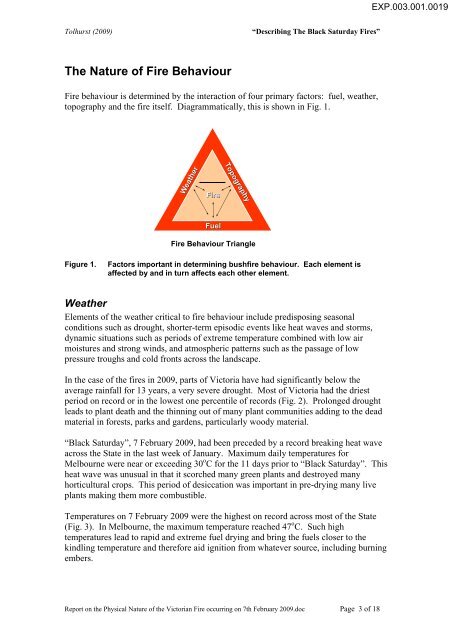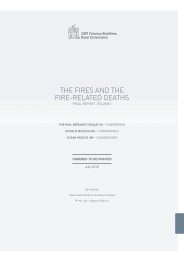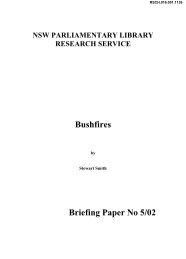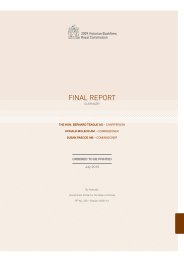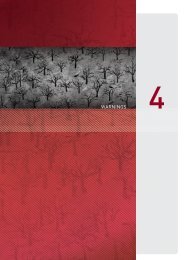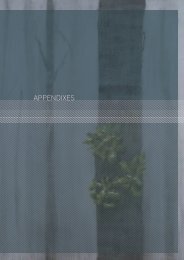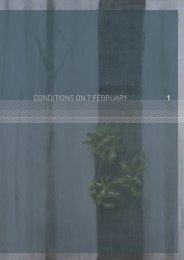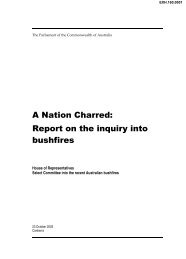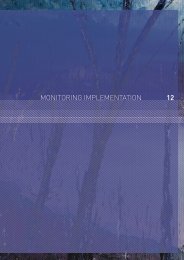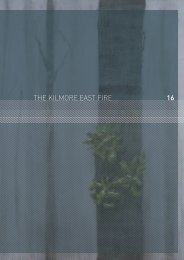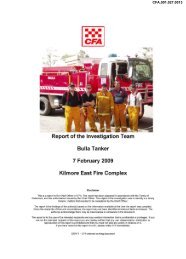Report on the Physical Nature of the Victorian Fires occurring on 7th ...
Report on the Physical Nature of the Victorian Fires occurring on 7th ...
Report on the Physical Nature of the Victorian Fires occurring on 7th ...
You also want an ePaper? Increase the reach of your titles
YUMPU automatically turns print PDFs into web optimized ePapers that Google loves.
EXP.003.001.0019<br />
Tolhurst (2009)<br />
“Describing The Black Saturday <strong>Fires</strong>”<br />
The <strong>Nature</strong> <strong>of</strong> Fire Behaviour<br />
Fire behaviour is determined by <strong>the</strong> interacti<strong>on</strong> <strong>of</strong> four primary factors: fuel, wea<strong>the</strong>r,<br />
topography and <strong>the</strong> fire itself. Diagrammatically, this is shown in Fig. 1.<br />
Topography<br />
Topography<br />
Wea<strong>the</strong>r Wea<strong>the</strong>r<br />
Fire<br />
Fuel<br />
Fire Behaviour Triangle<br />
Figure 1.<br />
Factors important in determining bushfire behaviour. Each element is<br />
affected by and in turn affects each o<strong>the</strong>r element.<br />
Wea<strong>the</strong>r<br />
Elements <strong>of</strong> <strong>the</strong> wea<strong>the</strong>r critical to fire behaviour include predisposing seas<strong>on</strong>al<br />
c<strong>on</strong>diti<strong>on</strong>s such as drought, shorter-term episodic events like heat waves and storms,<br />
dynamic situati<strong>on</strong>s such as periods <strong>of</strong> extreme temperature combined with low air<br />
moistures and str<strong>on</strong>g winds, and atmospheric patterns such as <strong>the</strong> passage <strong>of</strong> low<br />
pressure troughs and cold fr<strong>on</strong>ts across <strong>the</strong> landscape.<br />
In <strong>the</strong> case <strong>of</strong> <strong>the</strong> fires in 2009, parts <strong>of</strong> Victoria have had significantly below <strong>the</strong><br />
average rainfall for 13 years, a very severe drought. Most <strong>of</strong> Victoria had <strong>the</strong> driest<br />
period <strong>on</strong> record or in <strong>the</strong> lowest <strong>on</strong>e percentile <strong>of</strong> records (Fig. 2). Prol<strong>on</strong>ged drought<br />
leads to plant death and <strong>the</strong> thinning out <strong>of</strong> many plant communities adding to <strong>the</strong> dead<br />
material in forests, parks and gardens, particularly woody material.<br />
“Black Saturday”, 7 February 2009, had been preceded by a record breaking heat wave<br />
across <strong>the</strong> State in <strong>the</strong> last week <strong>of</strong> January. Maximum daily temperatures for<br />
Melbourne were near or exceeding 30 o C for <strong>the</strong> 11 days prior to “Black Saturday”. This<br />
heat wave was unusual in that it scorched many green plants and destroyed many<br />
horticultural crops. This period <strong>of</strong> desiccati<strong>on</strong> was important in pre-drying many live<br />
plants making <strong>the</strong>m more combustible.<br />
Temperatures <strong>on</strong> 7 February 2009 were <strong>the</strong> highest <strong>on</strong> record across most <strong>of</strong> <strong>the</strong> State<br />
(Fig. 3). In Melbourne, <strong>the</strong> maximum temperature reached 47 o C. Such high<br />
temperatures lead to rapid and extreme fuel drying and bring <strong>the</strong> fuels closer to <strong>the</strong><br />
kindling temperature and <strong>the</strong>refore aid igniti<strong>on</strong> from whatever source, including burning<br />
embers.<br />
<str<strong>on</strong>g>Report</str<strong>on</strong>g> <strong>on</strong> <strong>the</strong> <strong>Physical</strong> <strong>Nature</strong> <strong>of</strong> <strong>the</strong> <strong>Victorian</strong> Fire <strong>occurring</strong> <strong>on</strong> <strong>7th</strong> February 2009.doc Page 3 <strong>of</strong> 18


